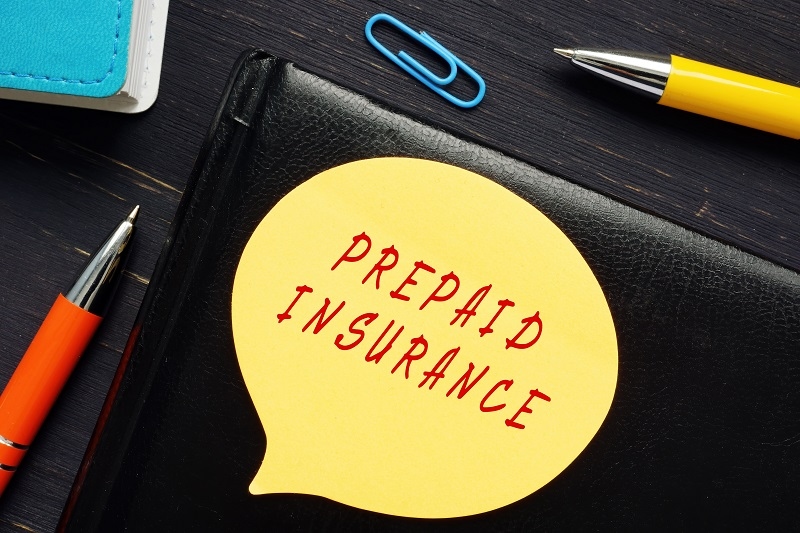
It is much easier to budget your monthly bills when you know large payments are coming—insurance being one of the biggest. If it's auto, health, renter, or life insurance, premiums fall due at the worst times, and you're scrambling for money. That's where prepaid/advanced insurance budgeting is a godsend.
This budgeting option enables you to pay your insurance premium charges in one payment, which gives you peace of mind, better money control, and sometimes a rebate. It's not possible for everyone, however, and there is a catch. This blog walks you through it all—how to do it, the prepaid insurance budgeting pros and cons, and how to plan for it smartly with the right resources.
Prepaid/advanced insurance budgeting is budgeting for insurance in advance. Instead of waiting until the payment due date on a policy, you pay what you owe for it in smaller installments and save them on a regular basis—usually monthly or quarterly.
For example, if your annual car insurance policy costs you $1,200, you can save $100 each month for a year. When your renewal period comes around, you have the cash, taking away the stress of having to come up with a lot of money at once.
It's not about convenience—it's about getting into a habit of sound budgeting that guards your cash flow and keeps you away from unnecessary financial stress.
There are a number of compelling reasons why advanced insurance budgeting should be considered:
Failure to pay an insurance premium can result in gaps in coverage, penalties, or even loss of policy. Saving in advance keeps the funds in hand when they are required, keeping policies renewed.
The cost of insurance can be overwhelming when all of it's paid together. Budgeting and paying the cost regularly gets rid of that financial strain and enables you to budget better.
Most insurance providers provide a discount for paying a policy upfront rather than monthly. You can save for this advantage if you plan carefully.
Having the assurance that your insurance is covered is less stressful financially. Not being financially unprepared is more about having peace of mind than numbers.
While the benefits sound enticing, there is no perfect financial strategy. Understanding the strengths and weaknesses of advanced insurance budgeting will allow you to make a decision regarding whether it is for you.
One of the worst aspects is that once you've prepaid or already saved the money, that money has to be kept separate and can't be used for any other type of emergency. If you do have an unplanned expense, your prepaid insurance savings will not come into play.
If you switch carriers or cancel a policy before it expires, refunding advance premiums can be time-consuming or slow, especially for longer-term policies.
This plan is based on your capacity to save regularly. If your income is not regular or you are not disciplined when it comes to budgeting, it will be hard to adhere to the plan.
Insurance premiums can vary from year to year. If you don't alter your savings plan to account for this difference, you could save too little—or too much.
To maximize this process, you will need a clear prepaid insurance budgeting strategy. This is how to come up with one that will work for you:
Start by creating a list of all your current insurance policies. They are automobile, home, health, life, renters, pet, and so on.
Write down when every one of the premiums is payable and how much they are. Also, note if payments are payable monthly, quarterly, or annually.
Establish how often you will budget for prepaid insurance. Monthly will work best for most, especially if you're paid monthly. Others will feel more comfortable budgeting bi-weekly or quarterly based on the income flow. Consistency is the key.
Split the amount you owe on each policy by the number of budget cycles you have remaining before the deadline. For instance, if your renters' insurance is $240 a year, split that up into 12 and put aside $20 a month.
It's a good idea to separate your insurance savings from your normal spending money. Consider setting up a separate savings account or a digital envelope system so you don't feel tempted to break into it for other things.

You do not have to do all this yourself in this day and age of technology. A proper prepaid insurance budgeting application will automatically do all this and give you visibility of progress.
A few of the most well-known ones are YNAB (You Need A Budget), Goodbudget, and Mint. All of these programs are designed to put you on a budget without having to struggle with tedious spreadsheets.
Choosing a suitable prepaid insurance budgeting tool makes this habit a simple, automatic part of your money management.
People are curious to learn the prepaid insurance budgeting tax consequences of premium insurance. Prepaying insurance is not tax beneficial for the majority of individual consumers. There are some situations that offer tax consequences, though.
If you are independently employed or a small business owner and buy business insurance (such as property or liability insurance), prepaying will impact your tax deductions. In some situations, prepaid premiums on insurance can be deducted when paid.
For individual taxpayers, however, unless your insurance premiums are paid from a tax-favored account—like an HSA for medical insurance—there's usually no additional benefit.
That aside, it is a good practice to keep all receipts and payment confirmations. If you might need to document your expenses or itemize your deductions for other reasons, these forms will come in handy.
Although in practice anyone can apply advanced insurance budgeting, it is specifically useful for:
Take David, for instance, who is a freelance graphic designer purchasing health, auto, and renters insurance.
In place of waiting for the annual payments to mature, David makes a prepaid insurance budget plan:
By having a prepaid insurance spending cycle that is synchronized with his income cycle every month, he is in control of his expenses. David also has a budgeting program that saves automatically for insurance so that he does not end up spending or forgetting the money.
By the time his car and renters policies come due, he's already insured and not feeling the economic squeeze.
These are some last-minute tips about how to budget for a hassle-free prepaid insurance:
Budgeting for prepaid insurance is a wise, proactive way to being financially ready for one of life's certainties. While it does require some planning and self-discipline, the dividend is decreased stress, better management of the cash flow, and even some saving in the form of lump sums or discounts.
You have complete control of your insurance expense by using the perfect prepaid insurance budgeting frequency, by having a thought-out plan, and by utilizing an exceptional budgeting program by understanding the advantages and disadvantages—how they will or won't affect your taxes—you can adapt this budgeting technique to suit you.
This content was created by AI